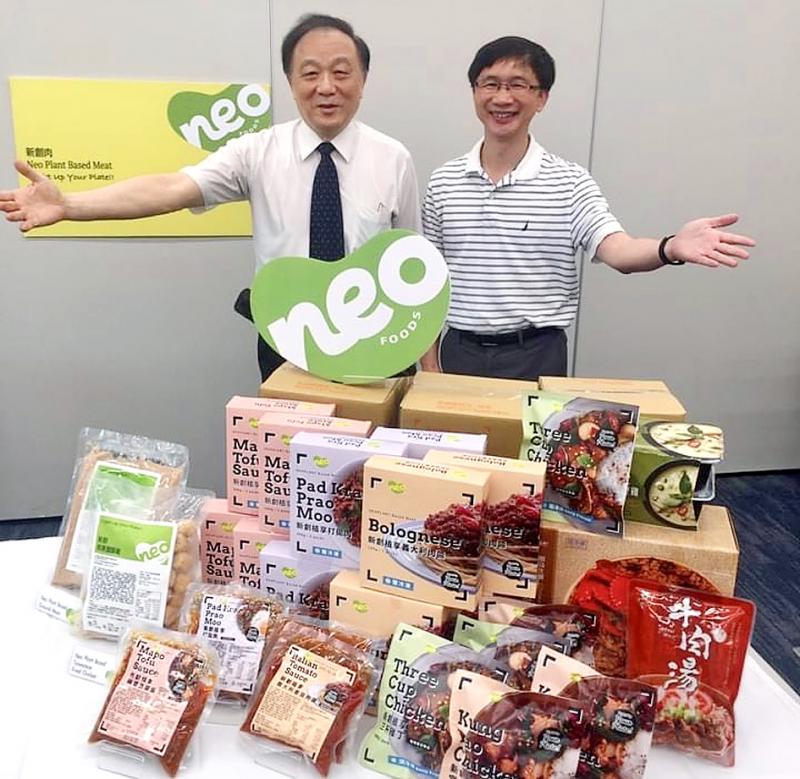Agriculture and food conglomerate DaChan Great Wall Group (大成集團) on Friday announced a NT$1 billion (US$36.1 million) investment in the development of a “neo foods” line of plant-based meat substitutes, seeking to increase its share in the rapidly expanding meat alternative market.
DaChan said it would set up a production facility in Taoyuan’s Yangmei District (楊梅), with production to start in two to three years.
The maximum annual output of the plant would be worth NT$2 billion, the firm said.

Photo courtesy of DaChan Great Wall Group
DaChan subsidiary Neo Foods Co (新食成) produces plant-based meat alternatives such as “chicken nuggets” and “burgers,” as well as mapo tofu or kung pao chicken, at its facilities in Taoyuan’s Jhongli District (中壢) and Tainan’s Yongkang District (永康).
About 13 percent of Taiwanese are vegetarians, DaChan chairman Charles Han (韓家宇) said, adding that he does not see Neo Foods’ market limited to that demographic.
Plant-based meat alternatives are a “new protein choice” for everyone, he said.
“Our neo meats have just as much protein as real meat and less additives compared with traditional meat substitutes,” Han said. “It tastes almost like meat. It is even more delicious and nutritious, and comes at an affordable price.”
DaChan’s neo meats are available on its Web site and on local e-commerce platforms, it said.
They would soon become available at convenience stores and restaurant chains, DaChan said.
The company said it expects rapid growth in the international meat substitute market.
Its plant-based products would debut at US supermarkets later this month, while an expansion to Europe and the Middle East is planned, DaChan said.
“DaChan will not miss out on the plant-based meat market,” DaChan vice president Dennis Han (韓家寅) said. “If we don’t do it, somebody else will.”

CHIP WAR: Tariffs on Taiwanese chips would prompt companies to move their factories, but not necessarily to the US, unleashing a ‘global cross-sector tariff war’ US President Donald Trump would “shoot himself in the foot” if he follows through on his recent pledge to impose higher tariffs on Taiwanese and other foreign semiconductors entering the US, analysts said. Trump’s plans to raise tariffs on chips manufactured in Taiwan to as high as 100 percent would backfire, macroeconomist Henry Wu (吳嘉隆) said. He would “shoot himself in the foot,” Wu said on Saturday, as such economic measures would lead Taiwanese chip suppliers to pass on additional costs to their US clients and consumers, and ultimately cause another wave of inflation. Trump has claimed that Taiwan took up to

A start-up in Mexico is trying to help get a handle on one coastal city’s plastic waste problem by converting it into gasoline, diesel and other fuels. With less than 10 percent of the world’s plastics being recycled, Petgas’ idea is that rather than letting discarded plastic become waste, it can become productive again as fuel. Petgas developed a machine in the port city of Boca del Rio that uses pyrolysis, a thermodynamic process that heats plastics in the absence of oxygen, breaking it down to produce gasoline, diesel, kerosene, paraffin and coke. Petgas chief technology officer Carlos Parraguirre Diaz said that in

SUPPORT: The government said it would help firms deal with supply disruptions, after Trump signed orders imposing tariffs of 25 percent on imports from Canada and Mexico The government pledged to help companies with operations in Mexico, such as iPhone assembler Hon Hai Precision Industry Co (鴻海精密), also known as Foxconn Technology Group (富士康科技集團), shift production lines and investment if needed to deal with higher US tariffs. The Ministry of Economic Affairs yesterday announced measures to help local firms cope with the US tariff increases on Canada, Mexico, China and other potential areas. The ministry said that it would establish an investment and trade service center in the US to help Taiwanese firms assess the investment environment in different US states, plan supply chain relocation strategies and

Japan intends to closely monitor the impact on its currency of US President Donald Trump’s new tariffs and is worried about the international fallout from the trade imposts, Japanese Minister of Finance Katsunobu Kato said. “We need to carefully see how the exchange rate and other factors will be affected and what form US monetary policy will take in the future,” Kato said yesterday in an interview with Fuji Television. Japan is very concerned about how the tariffs might impact the global economy, he added. Kato spoke as nations and firms brace for potential repercussions after Trump unleashed the first salvo of